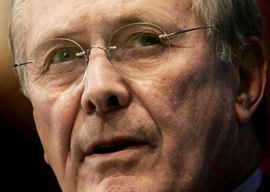
April 18, 2011

Donald Rumsfeld
From questions to decisions to implementation, there is quite a chain with quite a few links to which responsibility can be apportioned. Donald is not exactly ducking, though: “The responsibility was first and foremost with those of us who served as the senior officials in the administration.” But any mistakes were only ones of communication.
Donald Rumsfeld knows the importance of le mot juste and has a better grasp of it than the authors of Donald, so-called professional writers with master’s degrees in so-called creative writing. Rumsfeld understands the power of words and may even have an exaggerated faith in them: If things had been said differently, they might have ended up differently, he seems to intimate. He deplores Bush’s use of the word “coward” to describe the terrorists, as well as the phrase “war on terror”:
“Terrorism was not the enemy but a tactic our enemies were using successfully against us. Saying we were in a war on terrorism was like saying we were in a war against bombing or were waging a war on tanks, as opposed to a war against the people using those weapons.”
What Rumsfeld sees as one of the biggest mistakes in communication, and therefore in strategy, is the avoidance of the word “Islamic” in the administration’s rhetoric:
“From the beginning, members of the administration worked gingerly around the obvious truth that our main enemies were Islamic extremists. I didn’t think we could fight the crucial ideological aspect of the war if we were too wedded to political correctness to acknowledge the facts honestly.”
Islamic terrorism is not brought up in Donald either, only American hubris. After an amusing first chapter, Donald descends into detailed descriptions of the Guantanamo Bay prison. It makes heavy use of the phrase “concertina wire” and is not much more interesting than a hardware shopping list.
As Known and Unknown progresses, we get more and more passages such as
“…we were sending mixed messages…our inability to match actions with our public statements…lack of firmness…the dysfunctional clearance and confirmation process…an unfortunate consequence…actionable intelligence was scarce…a jumble of conflicting information.”
All those known unknowns and unknown unknowns end up making the United States look rather hapless. America emerges as a Candide-like character, full of good intentions but disastrously wandering into regions hungrier, angrier, and altogether more fervent than back home. The picture is darker than any satirist could paint, because we know that Rumsfeld knows. He is much too self-assured to appear hapless himself.
As for Nixon in China, it has a beautiful and elegiac ending”a polyphonic bedroom scene with the main characters contemplating their actions. “I am old and I cannot sleep….How much of what we did was good?” asks Chou En-Lai in the final aria.
It is hard to imagine self-doubt keeping Donald Rumsfeld awake at night.